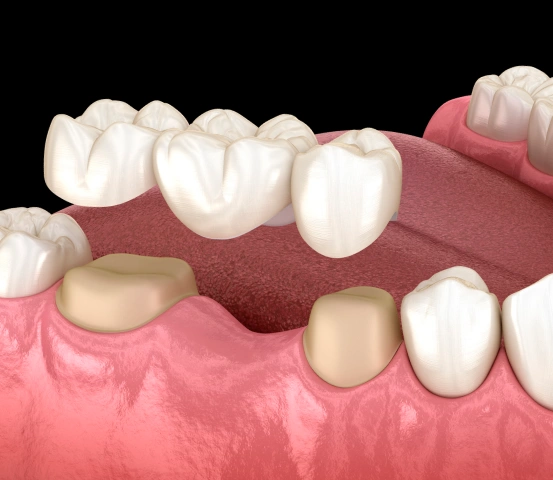
Your Guide to Dental Crowns & Bridges
Did you know…
What's the Crown and Bridge Process Like?
- Visit One: Preparing Your Tooth
Your comfort is our priority, so we'll start with a local anesthetic to numb the area. We then prepare your tooth by carefully reshaping its outer structure and removing any decay or old filling material. This step is crucial for ensuring your new crown fits perfectly and doesn't feel bulky. If a part of your tooth is severely broken down, we'll rebuild it, which feels just like getting a filling.
To create your permanent crown, we use a high-tech intraoral 3D scanner to capture a precise replica of your prepared tooth. This modern technology means you can skip the gooey, uncomfortable impression molds. We'll then place a temporary crown on your tooth with temporary cement. This temporary restoration will protect your tooth from sensitivity and hold the space until your final crown is ready. We'll give you specific care instructions to follow until your next visit.
- Visit Two: Placing Your Final Restoration
During your second appointment, you can get a local anesthetic if you feel any sensitivity, though it's not always necessary. We'll gently remove the temporary crown and clean off any remaining cement.
Next, we'll place your permanent crown and check the fit with a close-up X-ray. We will also make any necessary adjustments to ensure your bite feels perfectly comfortable before we use permanent dental cement to securely bond the crown to your tooth.
Essential Care Guidelines for Your Crown or Bridge
Your new crown or bridge is a valuable addition to your smile, designed for durability. While these restorations can last for many years—often between five and fifteen—their longevity depends on how well you care for them. The best way to ensure they last is with a strong daily hygiene routine, including regular brushing and flossing to prevent cavities. Consistent checkups and professional cleanings are also essential for keeping your entire mouth healthy.
Another common reason for damage to crowns and bridges is intense pressure from strong biting forces. If you clench or grind your teeth at night, these forces can cause your restoration to crack or wear down. To protect your investment, we may recommend a custom-fitted mouthguard to wear while you sleep.
